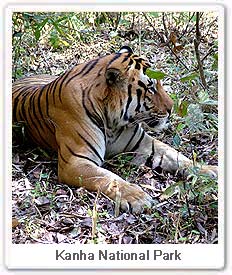Major Attractions : Leopards, Tigers and Bears.
Area Covered : 1,940sq. Km.
Ideal Time to Visit the Park : February to June. The park remains closed from 1st July to 31st October. It can be closed earlier as well, depending upon the arrival of monsoon.
Kanha Museum, Tadoba National Park (Maharashtra), Bamni Dadar(Sunset Point).
Some Major Accesses : Mandal.
Things to Know
Where is the Kanha National Park?
 At
the height of 600-900 m above the sea level, Kanha National Park is situated
in the central state of Madhya Pradesh in India. Tigers romancing in the
scenic surrounds of the park is a much loved as well as inspiring thought
for many. One of the world's best tiger reserve, Kanha is located among the
Banjar and Halon valleys in Madhya Pradesh's Mandal/Balaghat districts.Over
1,940 sq km of bamboo thickets, extensive grasslands and dense sal forests
make up Kanha- a series of plateaus which stretch across the eastern segment
of the Satpura ranges in Madhya Pradesh. Out of this 940sq.km. Is core area.
At
the height of 600-900 m above the sea level, Kanha National Park is situated
in the central state of Madhya Pradesh in India. Tigers romancing in the
scenic surrounds of the park is a much loved as well as inspiring thought
for many. One of the world's best tiger reserve, Kanha is located among the
Banjar and Halon valleys in Madhya Pradesh's Mandal/Balaghat districts.Over
1,940 sq km of bamboo thickets, extensive grasslands and dense sal forests
make up Kanha- a series of plateaus which stretch across the eastern segment
of the Satpura ranges in Madhya Pradesh. Out of this 940sq.km. Is core area.The Climate the Kanha National Park
Kanha National Park experiences tropical climate. The summers here are warm with mercury levels fluctuating between 40.6 degree centigrade to 23.9 degree centigrade. Summers here are hot and humid while winters are cool and pleasant. Temperature during winters ranges between 23.9 and 11.1 degree centigrade.
Important Dates in the Kanha's History
The central Kanha valley was declared a sanctuary way back in 1933. The adoption of this sanctuary into a national park took place in 1955, after much turbulence and storm regarding rampant killing of wildlife in the area at the time. One of the famous success stories of the park is the survival of the Barasingha population in the park, which went down to as low as 66 animals in 1970 from the earlier 3000 and which through huge efforts have now revived to a respectable number of around 1000. With the help of Project Tiger, the population of tigers have doubled since 1976.
The Ecological System in the Kanha National Park
The Flora in Kanha National Park
The flora in Kanha National Park chiefly comprises of Southern tropical Moist Mixed Deciduous Forest and Southern Tropical dry Deciduous Mixed Forest types. There are huge plateaus in the park with vast grasslands. Since there were villagers who inhibited this place earlier, there are a number of meadows inside the park. River Sulkum, Banjar and Nila irriogate the topography at this park. The slopes of the plateaus here are thickly covered with Bija, Haldu, Dhaora trees which stand along the long stretches of Ban-rahar, Bamboo and Sindhur tress. If you love photography, the park offers some bewitching views which are worth a click.
The Fauna in Kanha National Park
A major portion of the park is the core area with a wide variety of animal life. The major attraction of the ark is its tigers. Kanha is home to 22 species of large mammals. The major wildlife attractions in Kanha Wildlife Sanctuary are Royal Bengal Tigers, Leopards, Dholes (Indian wild dog), Indian Bisons, Sambar, Chital, Barasingha, Barking Deer, Black Buck, Chausingha, Nilgai, Monkeys, Mongoose, Mouse Deer, Sloth Bear, Jackal, Porcupine, Hyena, Jungle Cat, Hare, Rock Pythons among many others.
The Avifauna in the Kanha National Park
Kanha National Park is a home to over 300 species of birds. The most commonly noticed birds in the park are Pea fowls, Storks, Pond Herons, Egrets, Indian Peafowl, Partridges, spotted Parakeets, Green Pigeons, Cuckoos, Drongos, Warblers, Kingfishers, Woodpeckers and fly catchers.
Safaris in the Kanha National Park
Jeep Safari in Kanha National Park
Elephant trainers at Kanha National Park can take you to an extensive trip to its expansive wildlife. Taking an elephant ride through the park can be joyous as you can easily spot vivid variety of birds as well. For wildlife enthusiasts, nothing would be as rewarding as this.
Kanha National Park Travel Circuit
Delhi-Mandla-Kanha National Park
How to Reach Kanha National Park?
Air :The nearest Airport to Kanha National Park is Nagpur (265 km), which is well connected by air to major cities of India.
Rail :Jabalpur and Bilaspur are nearest Railway Stations.
Road :There is a daily bus service available for Kisli and Mukki from Jabalpur and back. Taxis are available for hire from Jabalpur, Bilaspur and Raipur. It is advisable to reach Kisli before sunset as vehicle are not permitted within the park after dark.






